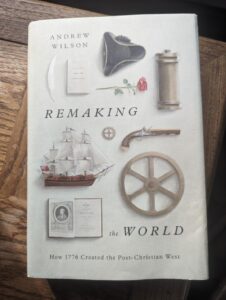The world is a weird place. Have you ever wondered:
♦ Why do most people, even those in Africa and Asia, wear western-styled clothing?
♦ Why do people believe that reason and science are the only ways to sure knowledge while simultaneously believing that we should make decisions by following our hearts?
♦ Why was every country in the history of the world a third world country until the 1800s?
♦ Why is soccer (aka football) the world’s most popular sport?
♦ Why are there now only six countries in the world that say they aren’t democratic when 250 years ago none said they were?
♦ Even though the western world has largely cast aside Christianity, why do we still tend to embrace the distinctly Christian values of love, freedom, justice, and human dignity?
Andrew Wilson thinks he knows the answer. And that answer is 1776.
 In Remaking the World Wilson contends “that 1776, more than any other year in the last millennium, is the year that made us who we are” (p. 7). In that year we find not only the birth of democracy in the American Revolution, but also of globalization, the industrial revolution, the enlightenment, the dawn of romanticism, and the rise of our ex-Christian world.
In Remaking the World Wilson contends “that 1776, more than any other year in the last millennium, is the year that made us who we are” (p. 7). In that year we find not only the birth of democracy in the American Revolution, but also of globalization, the industrial revolution, the enlightenment, the dawn of romanticism, and the rise of our ex-Christian world.
The year 1776 saw the publication of Adam Smith’s seminal ode to capitalism (The Wealth of Nations) and of Edward Gibbon’s (Christianity was the cause of) The Decline and Fall of the Roman Empire. That year James Watt installed the first steam engine in a commercial enterprise, and Rousseau began writing his landmark book on romanticism, The Reveries of the Solitary Walker.
But wait! There’s more!
And Wilson fills in his premise with impressive amounts of fascinating detail, vigorous synthesis, and penetrating insight. All the while he brings in contemporary illustrations from Hamilton and The Hunger Games to The Lord of the Rings and Game of Thrones.
Yes, he overplays the point that 1776 was the critical year for everything—but not by much. His case for the importance of that decade and the late eighteenth century generally is extraordinary. More to the point, when it comes to why our world is the way it is, he exhibits vast and highly illuminating explanatory power.
 Wilson closes with three Christian themes from the 1770s to help navigate the weird world that decade has bestowed on us.
Wilson closes with three Christian themes from the 1770s to help navigate the weird world that decade has bestowed on us.
Grace. We do not bear the impossible burden that our (enlightenment and romantic) world places on us of creating our own identity, status, and value. Rather, God shows his favor to us regardless of our accomplishments, intelligence, or wealth.
Freedom. Though Christians have often failed to live up to Jesus’ model of offering good news to the poor and liberty for the oppressed, we still have the opportunity to champion both. By the Spirit we can battle two opposite lies. On the one hand we can oppose the idol of materialistic (industrialized, affluent) success in the church in favor of spiritual flourishing. On the other hand, we can fight the gnostic heresy that the material world doesn’t matter by combating the lie that the physical lives of the poor and oppressed are not important.
Truth. Reality is not lodged in abstract, impersonal, scientifically verifiable principles. Rather truth is graciously personified in the Father, Son, and Spirit. Jesus, who was full of both grace and truth, again is our model. We dare not separate the two.
If you want to understand what’s going on in the world today and respond to it fruitfully, don’t follow the news. Instead read my “Book of the Year”—Remaking the World.
